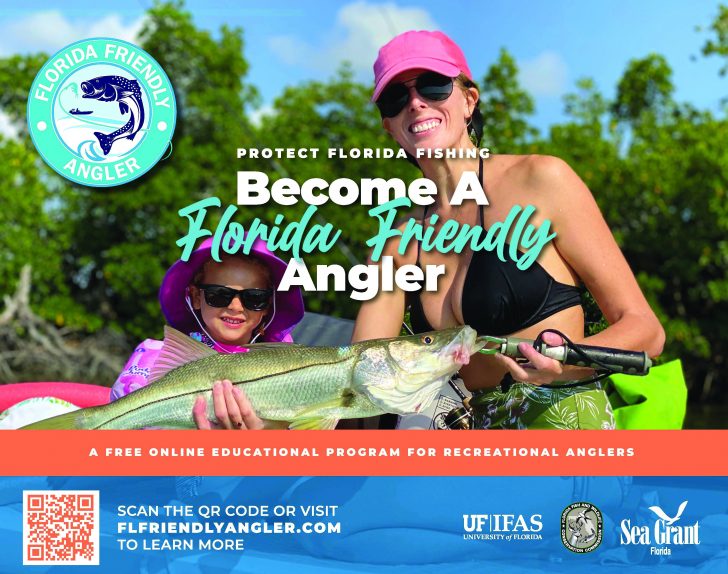By: Mike Sipos

The Florida Friendly Angler (FFA) is a free, narrated, online, short, do-at your-own-pace educational program that educates users on our state’s aquatic environments, best practices when fishing and the inner workings of fisheries management. By teaching the how and why behind topics that anglers encounter while interacting with Florida’s fisheries, the program hopes to reinforce practices that can ensure quality fishing experiences are here to stay, providing great memories and the economic impacts that follows.
The first portion of the program covers environmental ethics for anglers. In this section viewers learn the growing need for best practices and ethical behavior while interacting with fisheries and the environment. Anglers will learn about fishing pressure, how popular species like Gag Grouper have been affected in the past and what WE can do to help reduce the strain on heavily targeted species. There is also information on how environments like natural reefs and grass flats are impacted from careless behaviors such as anchoring on coral heads and creating propeller scars on sea grass beds while providing suggestions boaters on how to reduce those effects.
The second section of the course covers best practices when fishing. Anglers learn about conditions that can contribute release mortality and how factors such as improper handling can impact our favorite fish populations. The program provides information on how to reduce release mortality with suggestions on proper gear types, choosing the most appropriate gear and best landing/handling procedures. The module is filled with info like baitfish identification, how gills work, how to hold fish properly when snapping a photo and more!
Section three covers an introduction to fisheries management. In this portion, viewers learn why we have fisheries management, understand who manages our state’s fisheries and what management decisions are based on. Many anglers are aware of fishing regulations but may not know why they are put into place. The module also has info on management agencies, fisheries science tools, what is a stock assessment, population models, fisheries data and how anglers can contribute to science.
The information taught in the FFA course is not only applicable to fishermen but anyone who is interacting with the marine environment. Florida has some amazing critters and habitats that are heavily pressured from all fronts including tourists, new residents, hurricanes, red tides etc. A little bit of good information across a large group of people could help reduce destroying coral when anchoring, stop sea grass scaring, and making sure that the fish you just caught and released gets back in the water and continues provide memories for you, your child or your cousin from up North that’s just visiting.
Its quick, its easy, its free and even as an avid angler and biologist I learned a thing or two and was reminded about how my actions can affect the environment and the fisheries I know and love. The course is essential if you’re starting to fish in Florida and is still great even if you’ve spent years on the water with too many fish stories to remember. Give it a shot, you got nothing to lose, and you can get a neat sticker from completing the program. Visit FLFriendlyAngler.com to learn more. Tight lines!
Michael Sipos is the Florida Sea Grant agent for UF/IFAS Extension Collier County. Contact him at sipos624@ufl.edu. For more fishy content and updates on upcoming educational programs, check out the Collier County Sea Grant Facebook page, YouTube Channel, Instagram page or Michael Sipos’ UF/IFAS blog.
